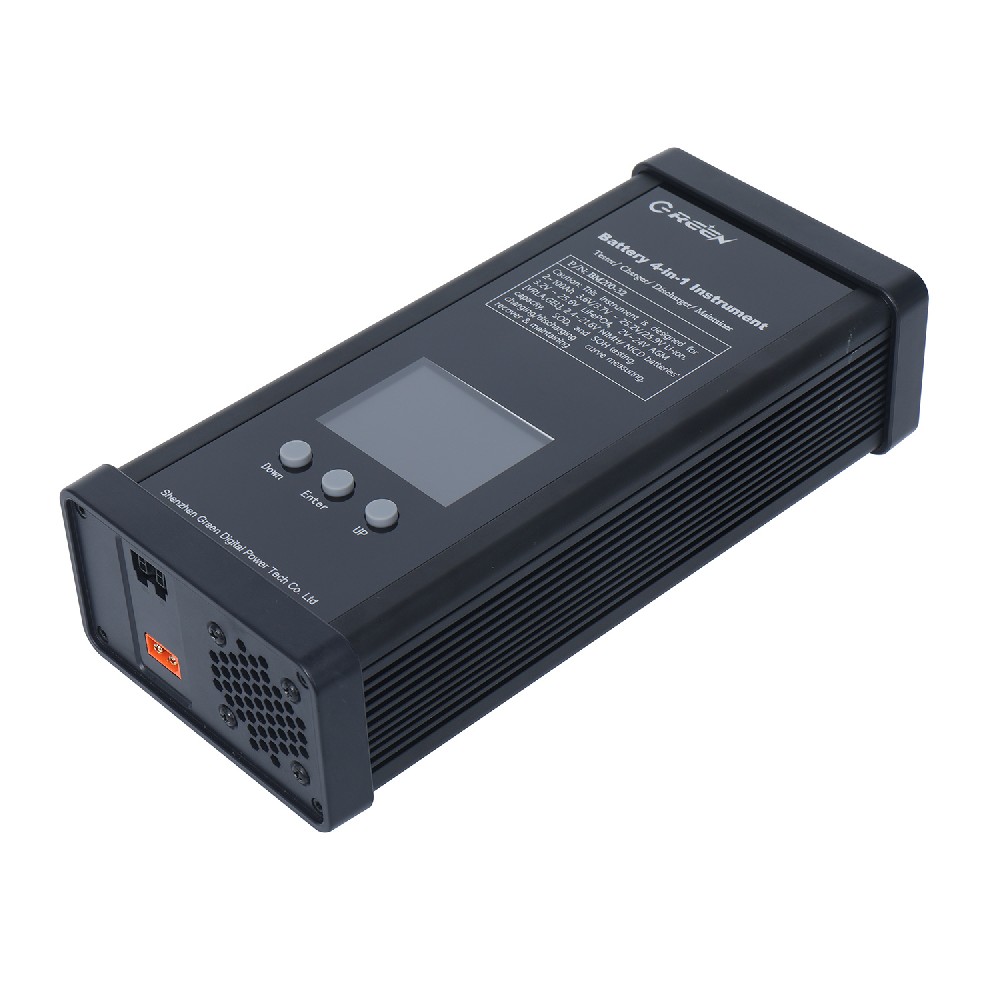
Coulomb Battery Meter 6V ~ 48V li-ion LiFePO4 AGM, NIMH
BG21 is a high-performance battery fuel gauge module suitable for various common batteries such as 6V to 48V li-ion batteries, LiFePO4 batteries, lead-acid (SLA, VRLA, GEL, AGM) batteries, NIMH/NICD batteries, and so on. She can measure battery voltage, charge/discharge status, charge/discharge current, state of charge (SOC), SOH, true battery capacity (Ah), charging curve, discharge curve, operating time, and other data. BG21 uses a Coulomb integral algorithm to accurately calculate the Ah capacity value of the battery and draw a charge discharge curve. BG21 is embedded with an automatic learning algorithm that can automatically learn the parameters of the currently connected battery, making it convenient for users to connect various types of batteries.

BM200 Battery tester for 2~29V Li-ion LiFePO4 AGM NiMH
For 2V ~ 29V 2~200Ah Li-ion, LiFePO4 and AGM battery,BM200 is an intelligent instrument that integrates the four functions of battery testing(analyzing), charging, discharging and maintenance. Charging current is up to 30A and single cell voltage cover 2V ~29V. This BM200 is a powerful assistant for electronic engineers. It can be used to perform performance testing, capacity testing, charging / discharging curves measurement, and activation and maintenance of long-term storage batteries for various commonly used rechargeable batteries.

BM6018 Battery analyzer & charger/discharger
For 2V ~ 18V 2~80Ah Li-ion, LiFePO4, AGM and NIMH batteris, BM6018 is an intelligent instrument that integrates the four functions of battery testing(analyzing), charging, discharging and maintenance. It is designed with a portable plastic shell, and with color TFT displayer and silicon touch keys. The BM6018 is a powerful assistant for electronic engineers. It can be used to perform performance testing, capacity testing, characteristic curve measurement, and activation and maintenance of long-term storage batteries for various commonly used rechargeable batteries.

BG1 Battery fuel gauge for Li-Ion & AGM batteries
Suitable for 3.6V~25.2V li-ion battery; 6V 12V 24V Pb-Acid battery. With 10-bit ADC MCU to measure battery voltage and power level. Using five segment LED indicator to display 10% ~ 100% battery power level (fuel gauge). Consumption current: viewing state 10mA, standby state 0.5mA.
SHENZHEN GREEN:Your trusted battery tester Manufacturer and provider

China National Hi-Tech Enterprise
In 2018, SHENZHEN GREEN DIGITAL POWER TECH CO., LTD was approved by China government as “China National Hi-Tech Enterprise”.In 2022, it won the title of “Specialized and Special New Enterprise" issued by Shenzhen Municipal Government.

Rich product experience
SHENZHEN GREEN DIGITAL POWER TECH CO., LTD has nearly 20 years of experience in various battery chargers, lithium-ion battery packs, lithium iron phosphate battery packs, battery pack management BMS and power adapter DCDC power modules.

Strong technical skills
SHENZHEN GREEN DIGITAL POWER TECH CO., LTD has more than 10 expert engineers, who are proficient in various high-frequency soft and hard switching technology, digital power control technology, power and battery management technology and communication technology (CAN, 485, 232, SMBUS, BT, LAN, etc).

Good development
In 2020 ,Green Digital Power Group’s annual sales reach to 10,000,000 USD.80% of our products are exported to the United States, the European Union, Japan, Russia and Australia. We are familiar with the safety requirements of various countries for power supply products. The continuous pursuit of product quality and safety is our eternal goal.
What is the battery tester ?
The battery tester is mainly used to detect current, voltage, capacity, internal resistance, temperature, battery cycle life, and give a curve chart. The battery tester has multiple channels to choose from. It can be started and controlled at a single point, and can test different models and types of batteries (NiMH, NiCd, Lithium, etc.) at the same time.
Functions and features of battery tester
Multifunctional products
GREEN BM6018 or BM200 is an intelligent instrument that integrates the four functions of battery testing(analyzing), charging, discharging and maintenance,BG21 is a high-performance battery fuel gauge module,BG1 is a battery fuel gauge module.For specific functions, please view product details.
Digital Display
BM6018 or BM200 can measure battery voltage, charge and discharge status, charge and discharge current, state of charge (SOC), real battery capacity (Ah), charge curve, discharge curve, running time and other data,BG1 has Five segment LED indicator, display 10% ~ 100% battery power level. ,BG21 can measure Battery voltage, current, charge and discharge status, charge (SOC), capacity (Ah), running time. This type of battery tester also called digital battery tester.
Multiple application scenarios
BM6018 is desged for many applications, like:Car & motorcycle starting battery charging and SOH (State of Health) test;Electronic products’ 1~ 4S lithium-ion battery performance test and analyze;Electric bike, forklift, sightseeing cars, golf carts’ battery SOH. feature test; Long-term idle battery capacity active, energy recover and maintain .For other product application scenarios, please see the corresponding product details.
Suitable battery type
BM6018 Suitable batteries: Pb-Acid, Li-Ion, LiFePO4, NiMH, NiCD....;Suitable batteries: Pb-Acid, Li-Ion, LiFePO4, NiMH, NiCD....;BG21Suitable battery: 6V~48V, Li-Ion, LiFePO4, Pb-Acid battery;BG1Suitable battery: 3.6V~25.2V li-ion battery or 6V 12V 24V Pb-Acid battery.For more parameters, please learn about product details.
Applicable to these scenarios to solve your battery anxiety
Automobile battery function test
Cars, sightseeing cars and motorcycles start battery charging and SOH (health status) testing
Electronic product battery test
Battery performance test for electronic products such as smartphones, tablets, and drones
Golf cart battery function test
Performance testing and routine maintenance of golf cart batteries
Power tool battery performance test
Performance testing and routine maintenance of power tool batteries
Electric bicycle battery function test
Battery function test of electric bicycles and forklifts
Idle battery activation
Long-term idle battery capacity activity, energy recovery and maintenance
FAQs for Battery Tester
Q: What types of batteries can a battery tester measure?
Q: What is the measurement accuracy of the battery tester?
Q: Can the battery tester test the internal resistance and capacity of the battery?
Q: Does the battery tester support rapid testing?
Q: Is the battery tester portable?
Q: Does the battery tester need calibration?
Q:How to determine if the battery needs to be replaced?
Q: How to extend battery life?
